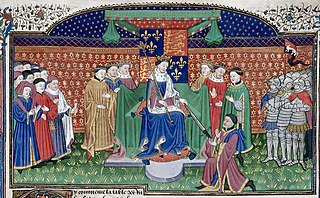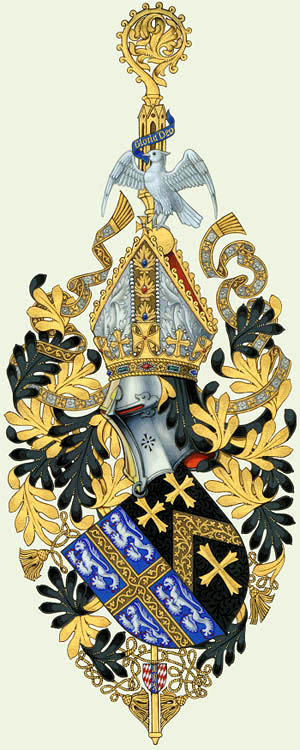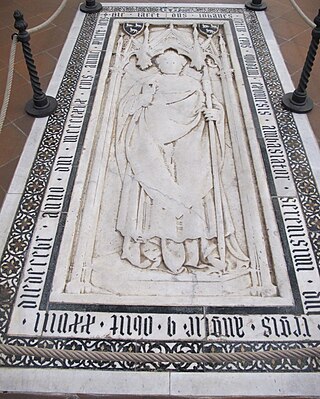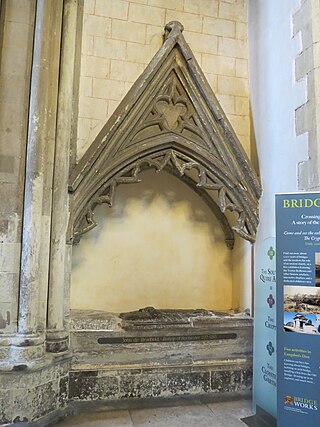Related Research Articles
William Whittlesey was a Bishop of Rochester, then Bishop of Worcester, then finally Archbishop of Canterbury. He also served as Master of Peterhouse, Cambridge.
Simon de Langham was an English clergyman who was Archbishop of Canterbury and a cardinal.

John Stafford was a medieval English prelate and statesman who served as Lord Chancellor (1432–1450) and as Archbishop of Canterbury (1443–1452).
Michael Northburgh, otherwise Michael de Northburgh (Northborough), was the Bishop of London between 1354 and his death in 1361. He was the nephew of Roger Northburgh, Bishop of Coventry and Lichfield.
Simon Islip was an English prelate. He served as Archbishop of Canterbury between 1349 and 1366.
Marmaduke Lumley was an English priest, Bishop of Carlisle from 1429 to 1450, and Knight Commander of the Order of St. John of Jerusalem. He was a son of Ralph de Lumley, 1st Baron Lumley and Eleanor de Neville. He was elected about 5 December 1429, and consecrated on 16 April 1430. He was Bishop of Lincoln for a short time before his death in December 1450. He was educated at University of Cambridge and was appointed Precentor of Lincoln Cathedral in 1425. He also became Chancellor of the University of Cambridge in 1427 and was Master of Trinity Hall, Cambridge from 1429 to 1443. From 1446 to 1449 he served as Lord High Treasurer of England. Lumley's tenure as Lord High Treasurer occurred during the Great Bullion Famine and the Great Slump in England.
John of Thoresby was an English clergyman and politician, who was Bishop of St David's, then Bishop of Worcester and finally Archbishop of York. He was Lord Chancellor of England under King Edward III starting from 1349.
Thomas Bek was the Bishop of Lincoln from 1341 until his death. He was a member of the same family as Antony Bek, Bishop of Durham, and Thomas Bek, Bishop of St David's.

John Fordham was Bishop of Durham and Bishop of Ely. Fordham was keeper of the privy seal of Prince Richard from 1376 to 1377 and Dean of Wells before being named Lord Privy Seal in June 1377. He held that office until December 1381.
Adam Orleton was an English churchman and royal administrator.

Robert de Stratford was an English bishop and was one of Edward III's principal ministers.

John Barnet was a Bishop of Worcester then Bishop of Bath and Wells then finally Bishop of Ely.
Gilbert Welton was a Bishop of Carlisle. He was selected on 13 February 1353, and consecrated 21 April 1353. He died in November or December 1362.
William Lenn was a medieval bishop of Chichester and bishop of Worcester. The name Lenn was the old name for Lynn in Norfolk.

John Catterick was a medieval Bishop of St David's, Bishop of Coventry and Lichfield, and Bishop of Exeter.
Thomas de Lisle (Latinised to Thomas de Insula was a medieval Bishop of Ely.

John Bokyngham was a medieval treasury official and Bishop of Lincoln.

John Chadworth was Provost of King's College, Cambridge from 1447 until his election as Bishop of Lincoln. He was elected bishop about 11 February 1451 and consecrated on 18 June 1452. He died on 23 November 1471.

John Bradfield was a medieval Bishop of Rochester.
Thomas Trilleck was a medieval Bishop of Rochester.
References
- Fryde, E. B.; Greenway, D. E.; Porter, S.; Roy, I. (1996). Handbook of British Chronology (Third revised ed.). Cambridge: Cambridge University Press. ISBN 0-521-56350-X.